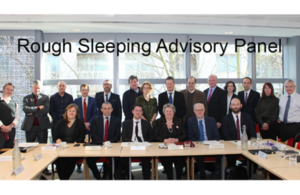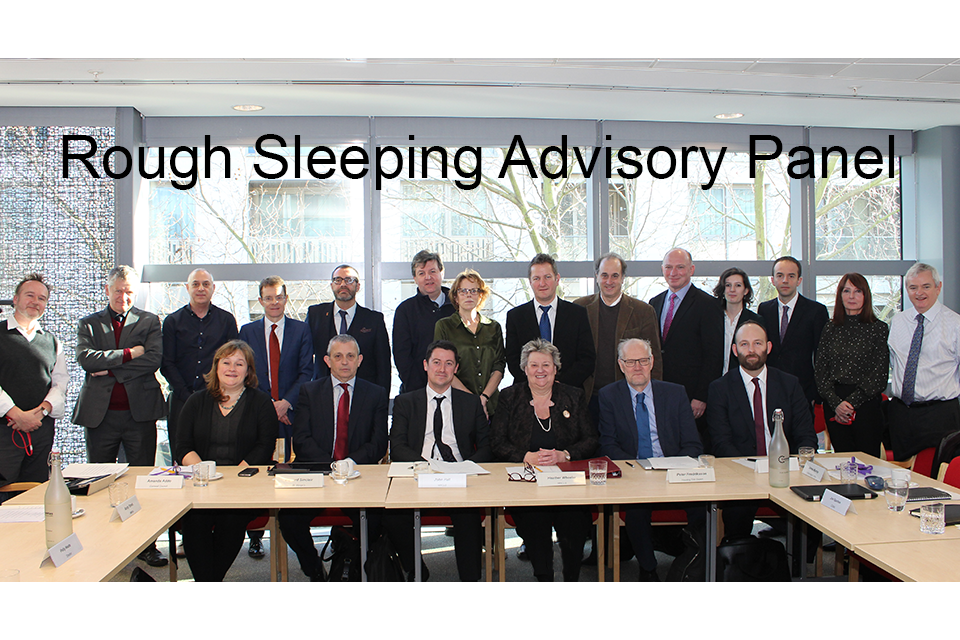New government backed advisory panel commits to help eradicate rough sleeping
Leading experts from homelessness charities and local government meet for the first time as part of the government's new rough sleeping advisory panel.

Leading experts from homelessness charities and local government met for the first time today as part of the government’s new rough sleeping advisory panel and committed to work together to help eliminate rough sleeping within a decade.
The new panel chaired by Homelessness Minister Heather Wheeler will help develop the national rough sleeping strategy to halve rough sleeping over the course of the Parliament and eliminate it altogether by 2027.
Made up of experts, charities and local government, the panel will draw on their considerable experience and individual successes to support the upcoming Ministerial Taskforce. This will bring together ministers from key departments to provide a cross-government approach to preventing rough sleeping and homelessness.
The panel members agreed key priority areas including what works best in terms of prevention such as housing-led approaches and the most effective ways of intervening with someone already experiencing rough sleeping.
Following the first panel meeting, Heather Wheeler said:
We cannot accept rough sleeping as a stubborn problem that will always be with us.
That’s why we are providing over £1 billion of funding, supporting those who are homeless and rough sleeping and bringing in the most ambitious legislation in decades that will mean people get the support they need earlier.
Tackling homelessness is complex, but no one should ever have to sleep rough.
The new panel is clear we need to act swiftly to realise our shared determination to help the most vulnerable in society and eliminate rough sleeping for good.
The panel will meet monthly and will report back to the Taskforce in the summer with a series of recommendations.
Among the key themes the panel will pursue are:
- Prevention activity to stop people from rough sleeping in the first place.
- Programmes and interventions to target both the drivers of rough sleeping and support vulnerable people at risk of rough sleeping.
- Recovery and long-term support to help people maintain sustainable tenancies.
- The role of wider society, business, the voluntary sector and the general public to tackle street culture.
- Better data and clearer accountability to ensure the right structures are in place at the local and national level.
Government action to date on tackling homelessness and rough sleeping
- As part of the £1 billion,of funding we are providing £315 million to local authorities for their work on homelessness, and an additional £402 million in Flexible Homelessness Support Grant funding, which local authorities can use to work more strategically to prevent and tackle homelessness pressures in their areas.
- Government has also provided funding for the ‘No Second Night Out’ approach which identifies new rough sleepers and helps them off the streets immediately. Ministry of Housing, Communities and Local Government (MHCLG) has funded its national roll-out through the £20 million Homelessness Transition Fund and most local authorities have committed to the programme.
- Announced £28 million for 3 Housing First pilots in Manchester, Liverpool and the West Midlands. The pilots will support long-term rough sleepers off the streets and help them to end their homelessness. Individuals will be provided with stable, affordable accommodation and intensive wrap-around support. This will to help them recover from complex health issues, for example substance abuse and mental health difficulties and sustain their tenancies.
- Government is investing £9 billion to build more social housing, including council homes. This government is committed to fixing the broken housing market and our Housing White Paper sets out measures to do just that.

Members of the Rough Sleeping Advisory Panel
Chair
- Heather Wheeler, Minister for Housing and Homelessness, Ministry of Housing, Communities and Local Government
Homelessness sector
- Jon Sparkes, CEO Crisis
- Polly Neate, CEO Shelter
- Jeremy Swain, CEO Thames Reach
- Howard Sinclair, CEO St Mungos
- Jean Templeton, CEO St Basil’s
- Rick Henderson, CEO Homeless Link
Mayors
- Andy Street, Conservative Mayor for West Midlands
- Andy Burnham, Labour Mayor for Greater Manchester Combined Authority
- James Murray, London Deputy Mayor for London Housing and Residential Development
Local government and Housing Federation
- David Orr, CEO National Housing Federation
- Mark Lloyd, CEO Local Government Association
- Mark Meehan, Director of Housing for Croydon and Chair of the London Council Housing Needs group
- Gillian Douglas, Bristol City Council
- Cathy Hadfield, Cornwall Council
International expert
- Peter Fredriksson, advisor on Housing First to the Finnish Government
Sector experts
- Lord John Bird, founder of the Big Issue
- Brooks Newmark, previous Minister for Civil Society
Background
Terms of reference
The government aims to halve rough sleeping over the course of the Parliament and eliminate it altogether by 2027.
The Minister for Housing and Homelessness, Heather Wheeler, will chair the Rough Sleeping Advisory Panel which will support government to produce a national rough sleeping strategy. The strategy will take action to reduce rough sleeping now, and ensure the structures are in place to eliminate rough sleeping by 2027.
Over the coming months the Advisory Panel will:
- meet with the Minister for Housing and Homelessness on a regular basis to advise on how we can reduce the numbers sleeping rough
- support the senior Ministerial Rough Sleeping and Homelessness Reduction Taskforce
- support the rough sleeping team in MHCLG to develop and test policy options
- test approaches, share feedback, best practice and studies from across the sector to inform policy development
Rough Sleeping is a chronic issue and the Advisory Panel will consider a wide range of interventions to ensure we take action now. The Panel will also look at how the government can embed integrated systems in the long term to ensure that no one has to sleep rough. The review will take into account the experiences and successes of previous interventions, and highlight good practice.
The following lines of inquiry will be pursued:
- Prevention activity to stop people from rough sleeping in the first place.
- Programmes and interventions to target both the drivers of rough sleeping and support vulnerable people at risk of rough sleeping.
- Recovery and long-term support to help people maintain sustainable tenancies.
- The role of wider society, business, the voluntary sector and the general public to tackle street culture.
- Better data and clearer accountability to ensure the right structures are in place at the local and national level.
Office address and general enquiries
2 Marsham StreetLondon
SW1P 4DF
Contact form https://www.gov.uk/gui...
General enquiries: please use this number if you are a member of the public 030 3444 0000
If your enquiry is related to COVID-19 please check our guidance page first before you contact us - https://www.gov.uk/guidance/coronavirus-covid-19-guidance-for-local-government.
If you still need to contact us please use the contact form above to get in touch, because of coronavirus (COVID-19). If you send it by post it will not receive a reply within normal timescale.
Media enquiries
Email newsdesk@communities.gov.uk
Please use this number if you are a journalist wishing to speak to Press Office 0303 444 1209
Social media - MHCLG
Twitter - https://twitter.com/mhclg
Flickr - http://www.flickr.com/photos/mhclg
LinkedIn - http://www.linkedin.com/company/mhclg